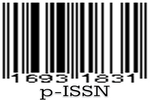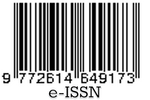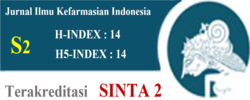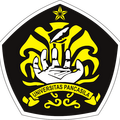The Relationship Between Knowledge Level on Drug Use and Drug Compliance in Hypertension Patients at Community Health Centers
Abstract
Hypertension is a silent killer disease because the symptoms are often without complaints and the treatment requires a long period of time, so the outcomes are greatly affected by patient compliance. Hypertension is one of the main factors causing heart problems, kidney failure and cerebrovascular disease. Compliance with taking medication in patients with hypertension is very important because it can control blood pressure to prevent complications. This study was conducted to determine the relationship between knowledge and drug compliance in hypertensive patients. The measurement of knowledge was done using the Hypertension Knowledge-Level Scale (HK-LS) questionnaire and the measurement of compliance using the Morisky Medication Adherence Scale (MMAS-8) questionnaire. The samples used were patients at Pasir Panjang community health center and Buntok community health center with a total sample of 95 people. The results obtained, the level of good knowledge was 39%, 33% sufficient knowledge and 28% less knowledge. Meanwhile, the high level of compliance is 41% and the level of compliance is 31% and the level of knowledge is at 28%. Data analysis using the chi-square test showed p-values of <0.05 which means that there was a relationship between the level of knowledge and drug compliance in hypertensive patients.
References
2. Riskesdas. (2018) Riset Kesehatan Dasar . Jakarta: Kementrian Kesehatan RI.
3. Liberty,I.A.,Pariyana Roflin,E & Waris L.(2017). Determinan Kepatuham Berobat Pasien Hipertensi pada Fasilitas Kesehatan Tingkat I. Jurnal Penelitian dan Pengembangan Pelayanan Kesehatan, I (1) 58-65.
4. BPOM (2006). Kepatuhan Pasien Faktor Penting Dalam Keberhasilan Terapi. Info POM.
5. Sanjaya, Guardian Y, Ni mah Hanifah, Hendri K Prakoso, Lutfan Lazuardi. (2016). Akses Informasi Sumber Daya Fasilitas Kesehatan Dalam Pelayanan Rujukan . Jurnal SISFO .Vol 6 No 1 ( 51 - 64 ).
6. Arikunto dan Suharsimi (2010). Prosedur Penelitian. Jakarta:Rineka Cipta.
7. Sinuraga.R.K, B.J.Siagian, A.Taufik, D.P.Destiani, I.M. Puspitasari, K.Lestari & A. Dianthini. (2017). Pengukuran Tingkat Pengetahuan tentang Hipertensi pada pasien hipertensi di kota Bandung: Sebuah studi pendahuluan. Jurnal Farmasi Klinik Indonesia,6, 290-297.
8. Departemen Kesehatan RI. (2013). Pedoman Teknis Penemuan dan Tatalaksana Penyakit Hipertensi., Jakarta : Direktorat Pengendalian Penyakit Tidak Menular.
9. Devi, L., Efendi & Saputra, E., Y. (2020). Faktor-Faktor yang Berhubungan Dengan Kepatuhan Penderita Hipertensi Dalam Menjalani Pengobatan di Puskesmas Karang Dapo Kabupaten Muratara. Journal of Nursing and Public Health, 8(1).
10. Kusmawaty, J., Hidayat, N & Ginanjar, E. (2016). Hubungan Jenis Kelamin dengan Intensitas Hipertensi pada Lansia di Wilayah Kerja Puskesmas Lakbok Kabupaten Ciamis. Jurnal Kedokteran dan Kesehatan 16 (2), 46-51.
11. Christi, D., T. Kandou, D., G & Nelwan, E., J (2018). Hubungan Antara Umur dan Aktivitas Fisik Dengan Derajat Hipertensi Di Kota Bitung Sulawesi Utara. Jurnal KESMAS., 7(5).
12. Pramestutie, H.R & Salvina, N (2016). Tingkat Pengetahuan Pasien Hipertensi Tentang Penggunaan Obat di Puskesmas Kota Malang. Jurnal Farmasi Klinik Indonesia 5, 26 – 34. DOI: 10.15416/ijcp.2016.5.1.26.
13. Budiman dan Riyanto A (2013). Kapitaselekta Kuesioner. Jakarta: Salemba Medika.
14. Harahap,Dewi Anggraini., et. al., (2019). Hubungan Pengetahuan Penderita Hipertensi Tentang Hipertensi Dengan Kepatuhan Minum Obat Antihipertensi Di Wilayah Kerja Puskesmas Kampa tahun 2019. Jurnal Ners Universitas Pahlawan; 3(2): 97-105.
15. Muhlis, muhammad. Alissa Jihan Prameswari ( 2020).Kepatuhan Penggunaan Obat Pada Pasien Hipertensi di Instalasi Rawat Jalan Salah Satu RSUD di Wilayah Daerah Istimewa Yogyakarta. Jurnal Insan Farmasi Indonesia . 3 (1), Mei 2020 ( 104-113).
16. Notoatmojo, S (2010). Teori dan Aplikasi Promosi Kesehatan. Jakarta : PT.Rineka Cipta.
17. Jess,F,J.F Gregory & A.Tomi (2017) Teori Kepribadian. Jakarta : Salemba Humanika.
18. Nurhanani,R.H.S Susanto & A. Udiyomo (2020). Hubungan Faktor Pengetahuan Dengan Tingkat Kepatuhan Minum Obat Antihipertensi (Studi Pada Pasien Hipertensi Essential di Wilayah Kerja Puskesmas Bandarharjo Kota Semarang). Jurnal Kesehatan Masyarakat,8,115-121.

This work is licensed under a Creative Commons Attribution-NonCommercial-ShareAlike 4.0 International License.
Licencing
All articles in Jurnal Ilmu Kefarmasian Indonesia are an open-access article, distributed under the terms of the Creative Commons Attribution-NonCommercial-ShareAlike 4.0 International License which permits unrestricted non-commercial used, distribution and reproduction in any medium.
This licence applies to Author(s) and Public Reader means that the users mays :
- SHARE:
copy and redistribute the article in any medium or format - ADAPT:
remix, transform, and build upon the article (eg.: to produce a new research work and, possibly, a new publication) - ALIKE:
If you remix, transform, or build upon the article, you must distribute your contributions under the same license as the original. - NO ADDITIONAL RESTRICTIONS:
You may not apply legal terms or technological measures that legally restrict others from doing anything the license permits.
It does however mean that when you use it you must:
- ATTRIBUTION: You must give appropriate credit to both the Author(s) and the journal, provide a link to the license, and indicate if changes were made. You may do so in any reasonable manner, but not in any way that suggests the licensor endorses you or your use.
You may not:
- NONCOMMERCIAL: You may not use the article for commercial purposes.
This work is licensed under a Creative Commons Attribution-NonCommercial-ShareAlike 4.0 International License.





 Tools
Tools





















